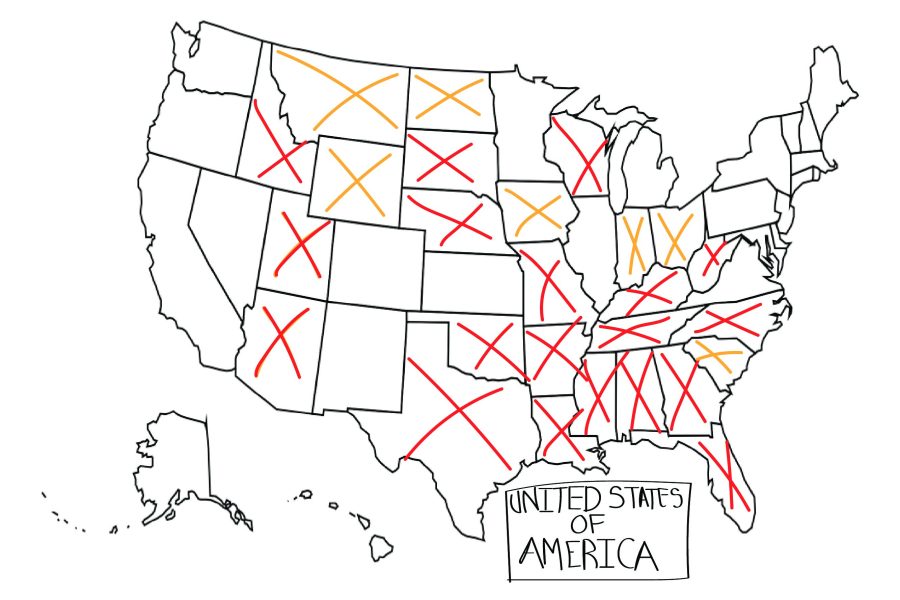Commentary: Making college decisions in a post-Roe world
Photo credit: Nina Sperling
A map of the U.S. has states crossed out in orange or red. States with a red “x” have banned or heavily limited abortion, and states marked with orange an “x” have uncertain legal status regarding abortion. States where abortion is legal are left blank. My friends and I have made maps like this after the Supreme Court overturned Roe v. Wade, the landmark case legalizing abortion, on June 24, 2022. At least 13 states have banned abortion as of December 2022.
January 22, 2023
I never thought my friends and I would be spending our time together crossing out states in red marker that we’d feel unsafe going to for college because abortion is banned.
When I thought about creating my college list, I asked the typical questions: Is the environment competitive or friendly? Will I be in the middle of nowhere or in a city? I did not think I would ever have to ask myself, “Is my right to bodily autonomy protected by law in that state, now that Roe v. Wade has been overturned?”
When the Dobbs vs. Jackson Women’s Health Organization decision was announced, June 24, I went to protest in front of the steps of the United States Supreme Court with other students from my summer program. The Dobbs decision overturned the landmark Roe v. Wade Supreme Court ruling, which, since 1973, has legalized abortion in the United States. The idea that five people have the ability to take away my bodily autonomy, future, professional and economic opportunity in the blink of an eye lit a fire under me and millions of other women.
Although a woman’s right to abortion is already protected by law in California, the idea that the government and people who are not medical providers can make this kind of decision in other states for millions of women is devastating. Around one in three women ages 15 to 45 currently live in states with abortion bans. As of Jan. 6, abortion is banned or heavily restricted in at least 18 states, including Wisconsin, Idaho, Texas, Kentucky and Georgia.
No matter how old they are, girls and women in 10 of those states will be forced to carry pregnancies to term, even if they were raped. Some states ban abortion starting at six weeks, which is often when women first find out they are pregnant. Many states are even introducing laws to ban women from traveling out of state to receive the procedure. While I will most likely not be applying to colleges in states where abortion is banned, the idea of several states’ status being up in the air makes me nervous.
Some of the top colleges in the nation, such as the University of Wisconsin-Madison, Rice University and Vanderbilt University, are in states where abortion is banned or tightly limited. It disheartens me to see a reality where college students are struggling to get access to contraception on campus and have to create plans to leave their state to get the care that could potentially save their lives. Colleges ensuring the safety of students on campuses should be a priority. I should not have to go to college worried about an unwanted pregnancy and inadequate healthcare.
Despite the harsh laws, women have some federal protection through Title IX, a civil rights law passed in 1972. Title IX prohibits discrimination on the basis of sex, including pregnancy and abortion, in any publicly funded school or education program. The Department of Education released a guidance sheet in October for schools on pregnancy and pregnancy-related conditions.
Women are not going to stop fighting. The five Supreme Court justices who took away our rights fired up an entire generation of young voters in the midterm elections this past November. In Kentucky, although the state has an abortion ban, voters rejected a ballot measure to amend the state constitution to protect “human life.” In Michigan, voters approved a proposition amending the state constitution to protect abortion rights and related health care.
Since the overturning of Roe, abortion in the country went down nearly 2% in the first two months of the ban because women and girls are finding other ways, such as traveling to other states or ordering abortion pills internationally online. The FDA also legalized over-the-counter abortion pills in retail pharmacies starting Jan. 3.
The idea that the government has never made any laws repressing men’s right to choose makes the Dobbs decision all the more oppressive and hypocritical.
As I prepare to visit colleges, I have thought about how living in a state without the right to choose would impact my college experience. Like most young people, I don’t want to have to worry about what would happen if I had an unwanted pregnancy or limited access to contraception.
I think of college as leaving home for the first time, making new friends and discovering who I am away from my family and home. Now, after the Dobbs decision, I have a new scenario to add if I decide to attend a school where abortion is limited. One encounter with someone I hardly know could tie me to them for the rest of my life and also run the possibility of a criminal record. Both are heavy choices for a college student to make.









